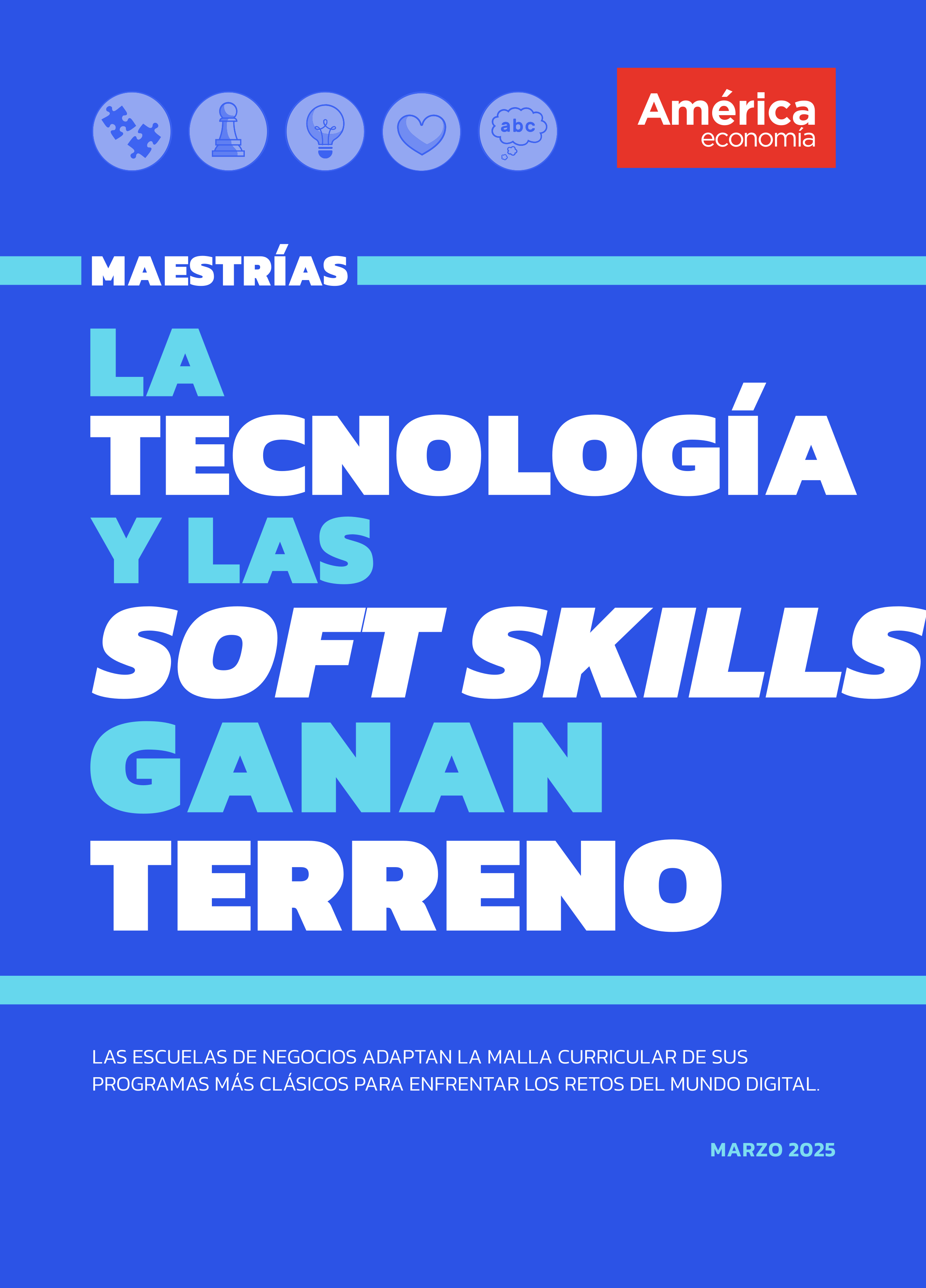For the corporate world, digital transformation is no longer an option, but a condition for survival. The business schools that are responsible for providing business leaders are adapting to that challenge, but some are hesitant on which path to take.
"Whoever has an MBA must understand technology and innovation because he or she will be working in disruptive companies or in companies that will be disruptive in the future."
This quote can be attributed to Sandra Richez, an American who today serves as director of the MBA Global at EDHEC Business School in France. She not only echoes the great recent commitment announced by President Emmanuel Macron to advance research into Artificial Intelligence (AI) but also reflects an intellectual concern climate among those who design the formation of the world's new corporate leaders.
Are they overreacting in France? Is this far from the reality in Latin America?
No and no. Take the case of a traditional regional industry: the automotive sector. Audi, Ford and BMW say that the future is driverless vehicles. These companies have set a 2022 deadline to present their first autonomous fleets to the market. Moreover, according to a 2017 study by the Brookings Institute, the industry has invested more than US $ 80 billion, as all companies seek to be the first to dominate this nascent market.
But not only are the traditional automotive companies running the race. Technological giants, such as Waymo from Alphabet, Tesla from Elon Musk and Baidu, the Chinese search engine, are also on the starting line. Also, auto parts makers such as Bosch and Continental, or microprocessors manufacturers, such as Intel, NVIDIA or Qualcomm, and even some considered unicorns like Didi Chuxing, Uber's Chinese rival, and nuTonomy, an MIT spin-off that has concentrated its efforts in developing technologies for this new breed of automobiles.
In Latin America, industries are already taking advantage of autonomous technology and integrating it into their daily activities. At the Gabriela Mistral mine, run by Chile's state-owned Codelco, 17 autonomous Komatsu trucks operate, something that has allowed a 25% increase in productivity. In a Brazilian sugarcane plant belonging to the Usaçucar Group, the damage caused by trucks trampling the cane sprouts was reduced by 4%, thanks to the semi-autonomous truck developed by Volvo in the company's industrial complex in Curitiba, Paraná.
Given this flowering of initiatives can we keep calling this sector the automotive industry?
Both US and European business schools, as well as those in Latin America, are closely watching these developments, which are repeated across nearly every sector, and understand that they will define the upcoming years challenges for the entire corporate world. However, some are adapting to the rhythm of these transformations, while others are just thinking about it.
Formerly, technology was confined to the IT department, "now it affects us every moment of the day, when buying online or using apps that break the market rules, such as Airbnb or Uber," says Martin Boehm, the IE Business School dean. "That's why companies are looking for employees with skills for digital change," he adds.
According to the International Data Corporation forecasts, in 2018 at least 40% of the organizations will have a consolidated digital leadership team, in 2019 the global investment for digital transformation will reach US $ 1.7 trillion, 42% more than in 2017, and, by 2020, 60% of companies will develop and implement an organizational digital strategy.
"The challenges future leaders will face not only depend on their leadership skills, but on their ability to lead 21st century businesses," says the Stanford Graduate School of Business associate dean, Yossi Feinberg.
Anticipating this phenomenon, business schools are remodeling from within, adapting to the industrial revolution 4.0. For example, the Peruvian ESAN Graduate School of Business nominated Peter Yamakawa, a PhD in Telecommunications Engineering from Osaka University, as its dean. This recalls the Harvard Business School decision to break with tradition and recruit Nitin Nohria, Ph.D. in Administration from MIT´s Sloan School of Management, as dean.
For its part, Centrum Graduate Business School has made an internal agreement with the faculties of the Catholic University of Peru to synergize the resources and laboratories of the various centers of this institution, such as biotechnology, engineering and design, to integrate MBA students into the projects, from prototyping processes to the capitalization of innovation. "This is an example of how the technological revolution is integrated and embedded into the education processes, so that our students not only know the theory of the fourth industrial revolution but know it from the installed capacity in our university and from companies that are beginning to capitalize it, " says Percy Marquina, Centrum CEO.
Another relevant impact has been the evolution of the curriculums offered by these B-Schools to cover digital transformation. Programs at Berkeley, Harvard and London Business School added courses such as Data & Decisions, Technology and Operations Management or Data Analytics to the core of their MBA offering.
But digital transformation is reaching even the most traditional disciplines. "We are facing a paradigm shift. There are major finance, marketing and strategy disruptions due to the fintech emergence and the new data collection tools", says Andrea Masini, associate dean of MBA at HEC Paris. The curriculum of the Haas School of Business at the University of California Berkeley is moving towards data analysis, health and science. "We make sure our students speak the technology language and apply it to create value in the different types of organizations they will lead," says Peter Johnson, the school's associate dean.
Blockchain, Technology Commercialization and Big Data courses have become a core part of the full-time MBA program of the Economics and Business Faculty at University of Chile. For Matías Lira, the faculty dean, "technology becomes a differentiating element in everything we do. From how we teach to what we teach. "
Some business schools offer tracks at the end of the MBA course so that students can specialize in management of technology-based companies. Tepper Business School at Carnegie Mellon University, for example, offers the Business Analytics Track, while EDHEC launched the Digital Innovation Track in partnership with IBM. HEC Paris will premiere two new tracks in Digital Innovation and Sustainability, Social Innovation and Disruptive Leadership.
Besides their MBA, schools have added to their portfolio new programs and masters focused on digital transformation, in addition to the already well-established Master in Business Analytics. IMD, for example, added in 2017 four programs focused on the latest disruptive technologies, and ESAN launched the Master in Information Technology Management and the Master in Digital Transformation.
There
But not all business schools are transforming themselves at a digital pace. Of the B-schools consulted for this article, most of those that have a whole technological strategy aren’t from Latin America. Although these schools are closely following the phenomenon , the fact is that Latin America, in general, is still on the other side of the digital border.
The main reason, according to the dean of the Faculty of Administration of Uniandes, Eric Rodríguez, is the development level of the Latin American countries and their industries. "We cannot create professionals only for a particular subgroup of companies or sectors that need technology, while the rest of the market does not have the capacity to absorb these digitally skilled executives," he says.
For this reason, LatAm schools conjugate their verbs in the future when they refer to their digital strategies. But they are working on it. For example, the faculty of Administrative and Economic Sciences at ICESI University is developing a specialization in data analytics with the Faculty of Engineering. IAE Business School has been working on the prototype of distance programs and hybrid online MBA programs, to be launched in the near future.
" We have an absolute budget disadvantage compared to United States or European universities when it comes to the implementation of ideas, so it takes us a bit far from our goal, which is to be completely competitive in this innovation wave", acknowledges Percy Marquina, of Centrum.
A few Latin American universities still show a quite embryonic understanding of the technological transformation, considering having an online platform, sharing e-books or PDFs with their students , or installing digital blackboards as technological turning points. Fortunately, they are a minority.
Survive in the digital jungle
Not everything is good and beautiful crossing the digital border. According to Google's favorite futurologist, Thomas Frey, more than 2 billion jobs will disappear by 2030, and according to the World Economic Forum, 57% of jobs in OECD countries are at risk of being replaced by machines.
There are also the dubious transparency valleys, as in technology ethics, which this year defined the international agenda with the case of Cambridge Analytica and Facebook, in which some corporations, using artificial intelligence (AI), used unduly and secretly the people’s information to favor Donald Trump´s campaign.
Despite these issues, schools are optimistic. "A large percentage of our students are interested in having a positive impact on society, even those who will work for multinational companies," says Peter Johnson of Berkeley Haas. Yossi Feinberg, of Stanford, adds that "there is a great student movement who not only want to do things well, but want to do good".
Both Johnson and Feinberg claim that their students’ needs have influenced changes within the school so that future leaders are able to interact with the society around them and create a positive impact. Berkeley offers that opportunity to students through the Center for Social Sector Leadership and the Center for Responsible Business, while Stanford does through its Center for Social Innovation.
The Administration School at the Pontificia Universidad Católica de Chile also seeks to bring its students to public institutions that need logistic and strategic intervention for "the university and the MBA to take an active role in social reality," according to its MBA director, Marcos Singer.
Warwick Business School not only expects its students to be the leaders in the digital transformation, but also "to know the consequences of technology, to manage their power and humanize it," says school dean Andy Lockett. Therefore, they study AI´s implications, and are developing an ethical guideline for data collection in partnership with IBM.
Internal transformation
As they teach their students, schools must also reinvent themselves and apply digital transformation to their own work, delivering a service according to the Industrial Revolution 4.0 that they intend to lead.
Perhaps the most famous example is the IE Business School’s Wow Room, in which the teacher is the only physical person among 48 augmented reality screens. Or maybe not: a robot can alternatively project a teacher’s hologram, which walks around the room interacting with the students, who are actually thousands of kilometers away. On the other hand, their students, spread in different countries, meet virtually and participate in classes and debates in the closest way possible to real presence. At the same time, using artificial intelligence and big-data, the statistics of what happened in classes are reported, which includes the students’ participation rate or the attention level.
"As an academic institution we ask ourselves how these new technologies are going to impact us. We have a team assigned to this question, including pedagogy and technology experts, to keep abreast of new trends and to be ahead of our customers’ needs”, explains the dean of IE Business School, Martin Boehm.
Latin American schools are also defining their digital transformation macro strategies. The Universidad del Desarrollo will launch its own Wow Room this year, which does not yet have a name. Centrum Católica Business School has added an IBM Watson application called Personality Insights, which, with AI, will analyze an applicant’s text to better understand his or her personality and thus save time and money resources in the process.
At the same time, the schools take advantage of the ecosystem in which they are inserted to bring the companies that lead the digital transformation and cutting-edge technologies to their classrooms. The Digital Center of HEC Paris, for example, works hand in hand with Air France, Capgemini and Orange, in academic subjects related to digital transformation and digital entrepreneurship.
IMD, for its part, opened its Global Center for Digital Business Transformation, founded with a US$ 10 million grant by CISCO. Sloan School of Management, at the same time, with its MIT Initiative for Digital Economy, has already co-produced researches with Deloitte, Haier and Thomson Reuters.
Together with bringing leading technology companies to the campus, the schools also send the students to the field. The EDHEC Business School, for example, seeks to get its students out of the classroom and understand the digital transformations that are occurring in companies like Amazon, Google and Amadeus.
Faced with this reality, not only the companies, but also the B-Schools, begin to record in stone the words of Peter Hirst, the associate dean of MIT Sloan School of Management: "to say that organizations must be serious about digital transformation, is like telling people they should breathe."














